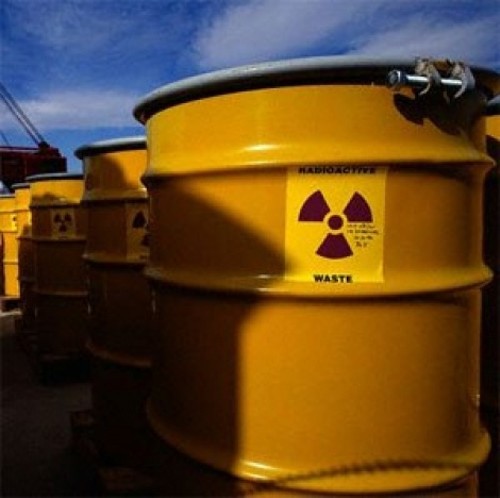This is the Place for Depleted Uranium
Radiation Control Board tables moratorium, gives EnergySolutions a window to import waste.
By Bob Henline“At times DEQ (Department of Environmental Quality) management has used its exemption from the rules powers and its discretion to bypass certain regulatory procedures in order to help facilitate the needs of industry. Examples of these exemptions include the conditional permit itself, allowing private ownership of a radioactive waste site, and pooling of multiple violations to reduce fines. When this has occurred, some division staff members have felt that the regulatory process has been compromised.”
This statement was part of a 1992 performance audit of the Utah Department of Environmental Quality, and sadly, things have only gone from bad to worse—as evidenced by the department’s pandering to the nuclear-waste industry. On July 14, the Utah Radiation Control Board met to consider a proposed moratorium on the import and disposal of depleted uranium at the EnergySolutions facility in Clive, Utah. The moratorium was proposed by the Healthy Environment Alliance of Utah (HEAL Utah) and supported by several scientists and members of the public. In fact, the only opposition to the moratorium expressed at the RCB meeting came from EnergySolutions, which stands to make a tidy profit from the disposal, and Tooele County Commissioner Colleen Johnson, who depends upon revenue from EnergySolutions to balance her county budget.
HEAL Utah’s position is a simple one, as stated by Executive Director Vanessa Pierce: "The main question is: Will Utah be the master of its own destiny, or will we simply leave it up to EnergySolutions, which stands to make huge profits from depleted uranium while leaving future generations at risk? Our hope is that the board will act decisively to protect the public by passing a moratorium."
The purpose of the DEQ and the RCB is to protect the citizens and the environment of Utah. The science proves that depleted uranium is a dangerous element, toxic for somewhere in the range of 4.5 billion years. The EnergySolutions facility at Clive was designed for Class-A “low-level” waste that is, by definition, rendered inert in roughly 100 years. For some unknown reason, the U.S. Nuclear Regulatory Commission decided to classify depleted uranium as Class-A waste, making it legal for it to be imported to Utah and stored at the Clive facility.
Over the course of the testimony, several things became apparent. First, depleted uranium is a nasty substance and poses a serious risk to the environmental and public health of Utah. Second, by EnergySolutions’ own admission, they haven’t done any modeling on the safety of storing DU at Clive beyond 500 years. Third, the geological instability of the Clive site renders disposal of this waste there, in the words of Dr. Steve Nelson, “patently absurd.”
Currently, the NRC is considering rules changes with regard to depleted uranium. NRC staff has issued a report indicating that the current rules did not consider the potential scope of depleted uranium disposal when they were drawn up. According to Laura Lockhart of the Utah Attorney General’s Office (in testimony at the meeting), this admission provides ample evidence that the federal rule is inadequate with regard to protecting Utah, giving the RCB the legal ground that they require to impose a “more stringent” rule.
What HEAL Utah has proposed is that depleted uranium not be allowed to be stored at the Clive site until the NRC finishes its process and creates the new rules for disposal. They have also added in an expiration date on the moratorium to ensure that it is not imposed indefinitely should the NRC delay for too long in its process. While EnergySolutions representatives, both engineers, assured the RCB that the material would be safely stored, they themselves admitted that their modeling and simulations didn’t account for the long toxic life of depleted uranium.
In a stunning display of political and moral cowardice, the Utah RCB voted 6-4 in favor of tabling the moratorium motion until its September meeting, when representatives from the NRC will be in Utah to receive input about the rule and possible changes. Apparently some members of the board are under the impression that in this meeting, which the NRC has labeled as a fact-finding hearing, the NRC representative will in some way shed some light on what the NRC intends to do with the DU rule. It is also apparent that the board members operating under that assumption have never dealt with federal officials on a fact-finding mission—they aren’t going to get any answers in September.
In the meantime, EnergySolutions can now import and store some 47,000 metric tons of depleted uranium that is ready for shipment at the Savannah River DOE facility. What this means is that even if the NRC should change the rules regarding the disposal of depleted uranium, the people of Utah will be stuck with this toxic waste for the next 4.5 billion years. What the board should have done was pass the moratorium and leave the DU where it is until such a time as the NRC creates rules to account for the longevity of this material. Barring that, they could have at least demonstrated enough courage to vote on the issue at hand instead of pushing it off for a couple of months hoping that the NRC gives them some kind of political cover.
Bob Henline is a social and political activist and resident of Tooele County, Utah.
More by Bob Henline
-
Utah Not Protecting Its Citizens
Allowing depleted uranium at EnergySolutions puts people at risk.
- Feb 2, 2010
-
Nobama in 2012
Failed promises make for a failed presidency.
- Dec 11, 2009
-
Freedom Roadblock
Salt Lake City is considering ordinances that will prohibit discrimination on the grounds of sexual orientation and gender identity. There are already laws on the books that seek to prohibit dis
- Oct 30, 2009
- More »




